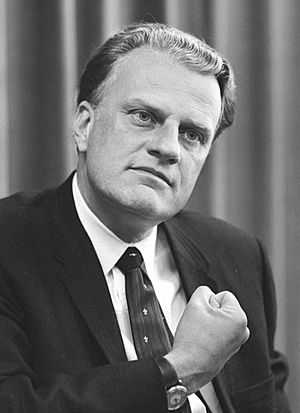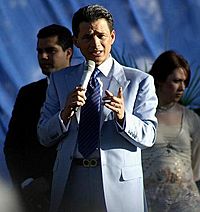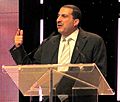Televangelism facts for kids

Televangelism is when people use modern ways to share their religious beliefs. They often use television or radio to talk about their faith. The main goal is usually to help others understand and perhaps join their beliefs. While it's very common in Christianity, other religions also use it.
The word "televangelism" is a mix of "television" and "evangelism." Time magazine first used this term. Today, it also includes religious speakers who use the internet to share their message.
It's important to know that televangelism is different from just watching a religious service on TV. For example, watching a Christian mass or a special blessing from the Pope is not televangelism.
Contents
Televangelism in Christianity


Christian televangelists often give speeches, called sermons. In these talks, they share what they believe is good news. They also often ask people to help their organization or a specific cause by giving donations. Many televangelists suggest that if people give money, they might experience miracles or blessings. This idea is part of something called "prosperity theology."
In Christianity, televangelists often have beliefs similar to those in the Charismatic Movement or Pentecostalism. These movements focus on spiritual gifts and experiences.
Televangelism in Islam
Televangelism also exists in Islam. Here, the speakers are usually Salafi Sunni Muslims, or they belong to Shiite or Alevite groups.
Yusuf al-Qaradawi is a well-known Islamic televangelist.
Harun Yahya is a Turkish Islamic televangelist. He talks about creationist ideas, which means he believes the universe was created by God. His ideas are also connected to the Gülen movement. He has a more modern style in his broadcasts, which can be unusual for the Islamic world.
Why Some People Criticize Televangelism
Televangelism has received some criticism. Some people, including religious leaders, have expressed concerns about it. They believe that some televangelists might be more interested in money than in truly helping people.
For example, a Christian theologian named John MacArthur has said that some religious television programs mislead people. He believes that their message is not the true message of Jesus Christ. He also suggests that some of the "miracles" shown on TV might not be real. Instead, he thinks they are tricks to get money from people who are going through tough times. He feels that these televangelists are not serving God but are instead focused on wealth.
Images for kids
-
Amr Khaled, an influential Egyptian Muslim televangelist, in Toronto, Canada
-
Televangelist Joel Osteen at Lakewood Church, a megachurch in Houston, Texas
See also
 In Spanish: Telepredicación para niños
In Spanish: Telepredicación para niños
 | Valerie Thomas |
 | Frederick McKinley Jones |
 | George Edward Alcorn Jr. |
 | Thomas Mensah |





